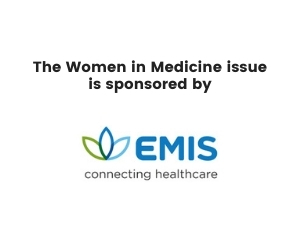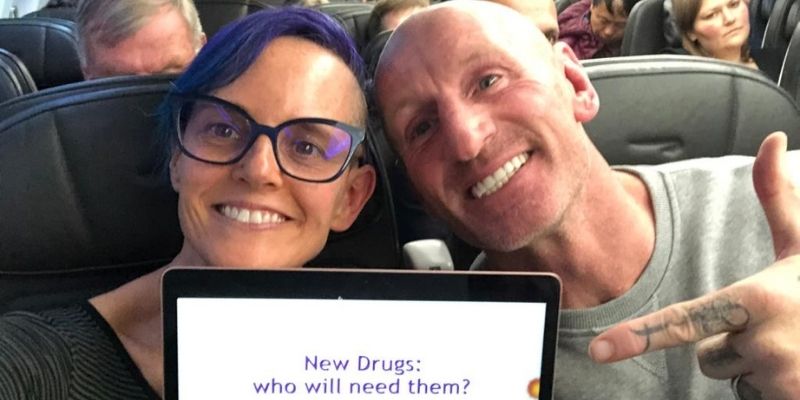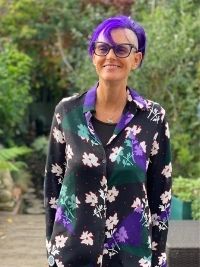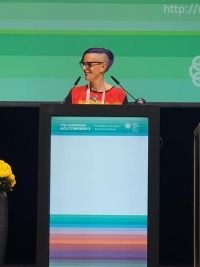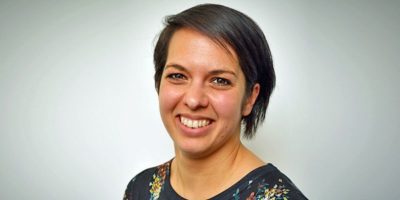Professor Chloe Orkin is vice-president of the Medical Women’s Federation, immediate past Chair of the British HIV Association (BHIVA), and a clinical professor of HIV medicine at the Queen Mary University of London. She has been a consultant physician at Barts Health NHS Trust for the last 16 years, where she provides care for people living with HIV and runs an award-winning clinical trials unit. Currently, Chloe is leading the Barts Health NHS Trust COVID-19 clinical research response including the vaccine effort.
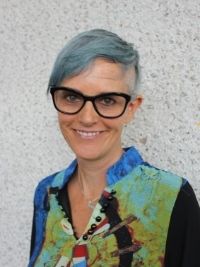
“…gender inequality is everyone’s problem and everyone is responsible for redressing it…”
From South Africa to the UK
I went to medical school in Johannesburg, South Africa, and trained at the Chris Hani Baragwanath Hospital, the largest hospital in the Southern Hemisphere. I came to the UK in 1998 and specialised in HIV medicine at Chelsea and Westminster Hospital.
I spent six months in Botswana during my training setting up a government-run HIV treatment programme together with my wife, who is a nurse. It was an incredible time – training doctors and nurses to rapidly start providing HIV treatment to a totally untreated population. After that, I took up a consultant post at Barts Health NHS Trust in 2003.
Working to improve the lives of people living with HIV
The focus of my career at Barts Health has been the provision of the best possible HIV treatment. This has involved enrolling patients into treatment trials so they could access the newest and best treatments. Our unit has contributed to the development of thirteen new drugs, including the first-ever long-acting injectable HIV treatment.
People who are undiagnosed with HIV have the worst health outcomes as they can become very sick before they are diagnosed. This is why early testing is very important.
I led two large-scale emergency week HIV testing weeks – Going Viral and Test Me East. Going Viral took place in nine emergency departments from Scotland down to London and has stimulated routine testing for HIV and viral hepatitis at Barts Health and other places with a high prevalence of infection.
From 2016-2019, I was the elected chair of the British HIV Association. I worked to challenge HIV-related stigma by providing medical evidence that challenged discriminatory legislation against people with HIV. I worked with rugby legend Gareth Thomas to explain HIV transmission to the public in his documentary ‘HIV and Me’.
The statistics concerning gender balance in medicine
- There is a gender pay gap of 17% for hospital doctors in England. Among the contributing factors are women being less likely to work as consultants and more likely to work in lower-paid specialities.
- Women are not yet represented in equal proportions in senior medical grades, with nearly 32,000 male consultants to just 18,000 female.
- The general practice gender pay gap is 33% – far higher than the average in medicine.
- Two-thirds of doctors in training grades are women, but within consultant grades, this drops to under half.
- Women are over-represented in lower-paid specialities, for example, public health and occupational health, but under-represented in the highest-paying specialities, such as urology and surgery.
- Variation across medical specialities, with male-dominated specialities such as urology, demonstrating a higher gender pay gap.
Joining the Medical Women’s Federation to affect positive change
I decided to join the Medical Women’s Federation (MWF) when I was ‘trolled’ on Twitter following my ITV news appearance as global lead investigator for the first injectable HIV drug.
I was ‘trolled’ not because of what I said, but because of how I looked: my blue hair, my short haircut, my choice in clothing – I was called homophobic and misogynist names. This made me decide that in a world where a woman in science is publicly vilified for her appearance gender equality is a distant dream but I want to be part of the journey towards achieving it.
As MWF vice president, I have provided advice to the British Medical Association (BMA), General Medical Council (GMC), and Royal College of Psychiatrists (RCP) on gender and equality. I have since taken up a role at the Queen Mary University of London I aimed at safeguarding gender equality at the medical school.
This work has helped me to become a more articulate and confident advocate on inequality in general and to speak up as a lesbian role model. I was featured in the DIVA magazine Top 100 Lesbian awards in 2020.
During COVID-19 my research on poorer health outcomes in the BME [Black and Minority Ethnic] community has led me to become the BME research champion for my region.
In addition to supporting and championing women and their careers, MWF has evolved to become the voice of women doctors on medical issues. We represent cis and gender diverse women in the profession too.
Recognising the importance of male allies and good bystanders, last year we introduced honorary fellowships for strong male allies. We appointed them at our last conference and this feels like a very important step toward helping others to understand that gender inequality is everyone’s problem and everyone is responsible for redressing it.
How COVID-19 has impacted women
The lockdown has disproportionately affected women’s careers because studies show that women have done most of the childcare and most of the home-schooling. The effects of this will affect career progression in future years.
We recognise the need to provide virtual educational content during the pandemic so we are running a series of webinars on gender-related topics, for instance, this month renowned barrister and Women’s Equality Party lead candidate for the London Assembly elections in May 2021, Harini Iyengar, will speak on achieving gender equality in law and medicine.
Our autumn virtual conference
This virtual conference offers a very exciting programme including cutting-edge speakers and a panel which I will chair, exploring the experiences of women during the COVID-19 pandemic.
We will hear a range of different voices: academic women, women redeployed to the acute COVID wards, women who had to home-school children, pregnant women and junior doctors.
Future plans to tackle gender inequality
At MWF we have a range of plans to run an innovative speed mentoring events and to address inequities as they arise. For example, recently the government removed the requirements for universities to achieve the Athena SWAN gender-equality charter mark in order to qualify for research funding.
This had been an important motivator to ensure that universities complied with the aims of the gender equality charter. So, this decoupling is of major concern and MWF will work to monitor the effects of this on academic women’s careers. We are also working with the British Medical Association to help redress the structural sexism and gender inequities unmasked last year in a high-profile report.
https://www.qmul.ac.uk/blizard/staff/centre-for-immunobiology/staff/chloe-orkin.html
https://twitter.com/profchloeorkin
